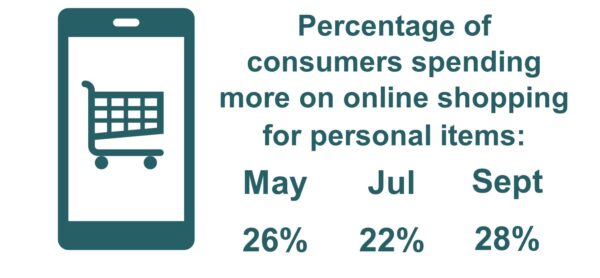Media Hub

2020 has been a year like no other. The COVID-19 pandemic and associated health measures have affected us all, be it directly or through our families and friends and across our communities.
COVID-19 has also affected our experiences as consumers in some way, shape or form – be it the impacts of product shortages, higher prices and cancellations; increased reliance on essential services like energy and telco; being forced to take on debt to manage losses of income; or the increased use of online and data-driven technologies, products and services. CPRC’s Consumers and COVID-19 from crisis to recovery foundational report released in June, and our consumer survey research program (running from May to December 2020) explores many of these issues by asking consumers about their experiences across a range of markets during 2020.
The increased use of online and data-driven technologies, products and services promises to have a lasting effect on consumer policy into the future. Lockdowns and health restrictions have seen Australian consumers participating online at record levels. This shift is shown in a host of consumer research released throughout 2020[1], including CPRC’s own COVID-19 survey data. For example, our research shows that around 1 in 4 Australian consumers have been spending more shopping online for discretionary personal items (e.g. clothing, cosmetics, electronics, etc) than they were before COVID-19 began in late March, and that this continued even once in-store shopping restrictions eased around Australia.

Many businesses have also responded to COVID-19 restrictions by seeking to adjust their business models so they can better reach, and continue to serve, customers through online channels. Governments have sought to support and accelerate this trend of digitisation, to help increase both business resilience and drive economic growth. Initiatives to accelerate this shift to digitisation form a key part of the federal government’s goal for Australia to be a leading digital economy and society by 2030.[2]
In parallel to the broader consumer policy landscape changes caused by COVID-19, CPRC has been producing valuable research and evidence relevant to data and technology policy, in collaboration with others.
Highlights from 2020 include:
While progressing this original research, CPRC has also been actively engaging in a number of policy and regulatory processes throughout the year. These have included processes arising out of the Australian Competition and Consumer Commission’s (ACCC) landmark Digital Platforms Inquiry Final Report[3], such as:
CPRC’s input into the CDR has gone further than participating in policy processes. We have also been engaged by the Data Standards Body (DSB) to work with the community sector to explore the risks and opportunities posed by the introduction of the CDR. Though this work – which is led by CPRC Research and Engagement Manager, Nina Lewis – we are continuing to consult with community organisations and provide advice to DSB on how data standards can support a fair, safe and inclusive CDR capable of achieving the positive outcomes that all Australian consumers deserve.

Our data and technology focus for 2021 will continue to be centred on how CPRC can contribute to policy and practice changes that achieve fairness, safety and inclusion for all consumers across the digital economy. Maintaining consumer trust in data-driven technologies, products and services will also be critical to a digital-led recovery from the COVID-19 crisis.
The state of play right now is that data-driven innovation and markets are expanding and changing rapidly – and regulation and policy is playing catch-up. Our work will continue highlight the importance of a modern, economy-wide protection framework in Australia. And we’re particularly keen to work closely with our policy and regulatory colleagues to accelerate reforms that ensure fairness, safety and inclusion are hallmarks of Australian digital markets. As an innovative country that champions competitive markets and consumer empowerment, we can tackle – collectively – the lack of transparency, the bargaining power imbalances, and the exploitation of consumer behavioural biases that currently characterise the data practices found in digital markets.[4]
Just as governments seek to accelerate the digitisation of the economy, it is paramount that governments also accelerate reforms that modernise key economy-wide protections for Australian consumers to help build trust, confidence and resilience in the medium-term.
CPRC very much look forward to working with our colleagues across government, regulators, industry, academia and the community sector on these important issues in the new year.
[1] For examples, see surveys from the eSafety Commissioner, the Office of the Australian Information Commissioner and the Australian Communications and Media Authority
[2] See Australian Government’s Digital Business Plan.
[4] These were key findings from the ACCC’s 2019 Digital Platforms Inquiry Final Report (see section 7.9.2)
Consumer Law
September 12, 2024
While there are some positive developments the fragmented approach potentially leaves crucial gaps in protecting Australians' digital rights.
Consumers in digital world
June 05, 2024
Recently, trusted Government departments have celebrated the reported downturn in financial losses from scams in Australia. Sounds good, right? We are all getting savvier, we are all onto scammers. Or are we? I recently had a brush with a scammer which got me thinking about these reports and what the numbers mean.